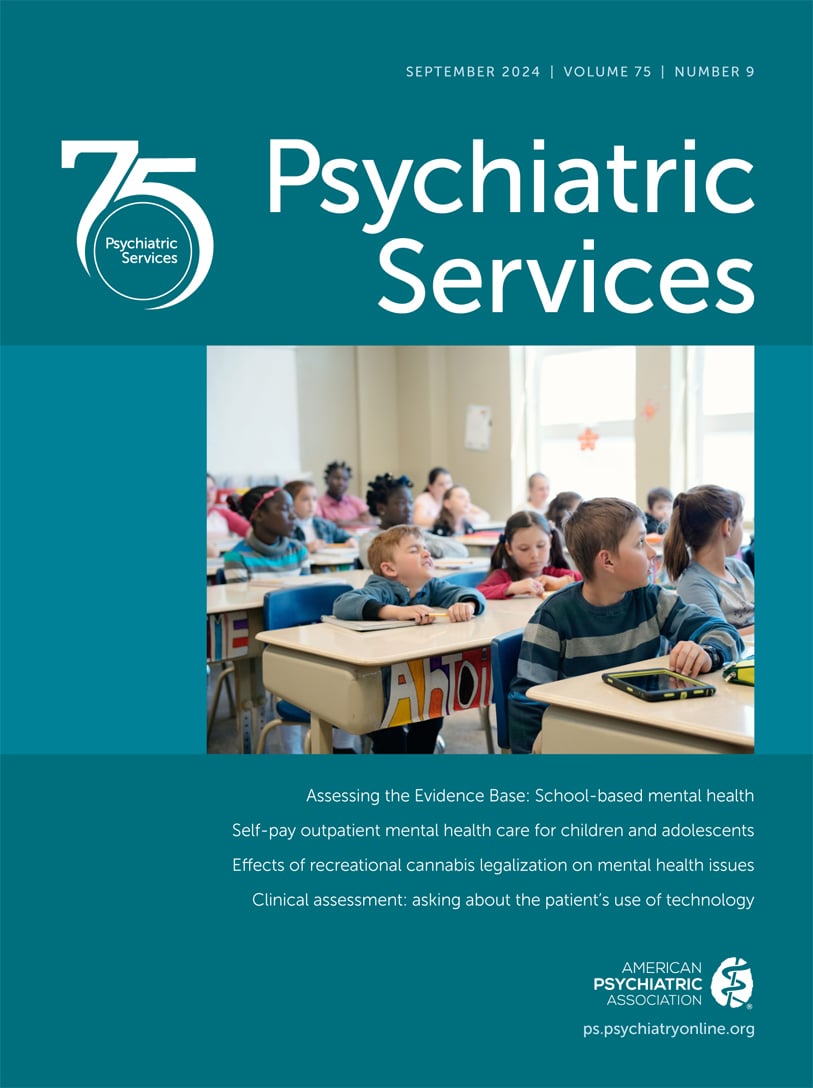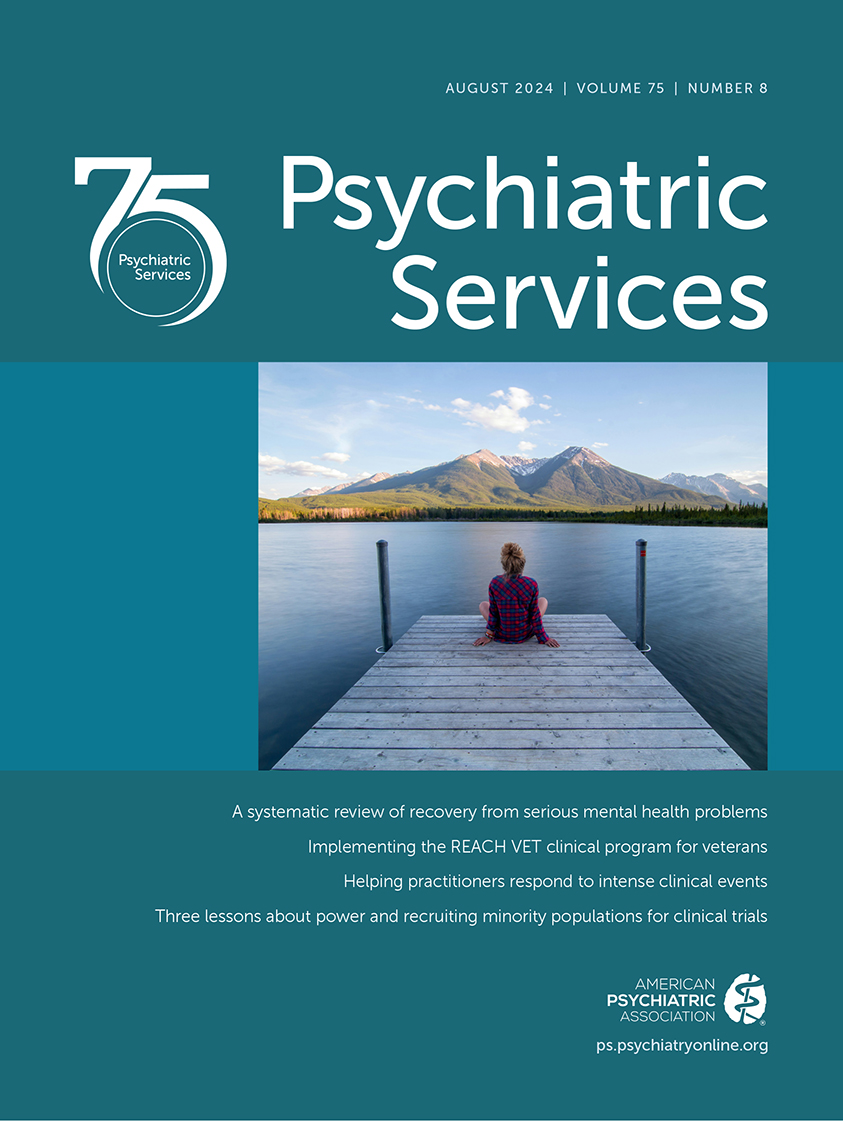Psychiatric Services
- Volume 62
- Number 4
- April 2011
Taking Issue
This Month's Highlights
Columns
Publication date: 01 April 2011
Pages344–346This column reports results from a qualitative study of employees' knowledge of and access to mental health benefits after implementation of New York State's parity law in 2007. Fifty-four employed individuals with insurance coverage were interviewed by ...
https://doi.org/10.1176/ps.62.4.pss6204_0344Publication date: 01 April 2011
Pages347–349When can pharmaceutical companies be held liable for failure to disclose medication risks—such as the link between selective serotonin reuptake inhibitors and suicidality of young people? The companies have claimed that Food and Drug Administration ...
https://doi.org/10.1176/ps.62.4.pss6204_0347Articles
Publication date: 01 April 2011
Pages353–359Objective: Approximately three-quarters of people with severe mental illnesses smoke cigarettes, and the rate is even higher among those with co-occurring substance use disorders. This longitudinal study explored patterns of cigarette use and cessation ...
https://doi.org/10.1176/ps.62.4.pss6204_0353Publication date: 01 April 2011
Pages360–366Objective: Rates of cigarette smoking are high among people with severe mental illnesses compared with the general population (45%–90% versus 20%). The authors developed a Web-based computer decision support system that is tailored for use by people with ...
https://doi.org/10.1176/ps.62.4.pss6204_0360Publication date: 01 April 2011
Pages367–373Objective: The aim of this study was to replicate and extend results of a previous blended efficacy and effectiveness trial of a low-intensity, manual-based guided self-help form of cognitive-behavioral therapy (CBT-GSH) for the treatment of binge eating ...
https://doi.org/10.1176/ps.62.4.pss6204_0367Publication date: 01 April 2011
Pages374–380Objectives: Many depressed women seen in community mental health centers (CMHCs) have histories of childhood sexual abuse and are economically disadvantaged. Randomized trials are needed to test the effectiveness of evidence-based interventions in this ...
https://doi.org/10.1176/ps.62.4.pss6204_0374Publication date: 01 April 2011
Pages381–388Objective: Adequate treatment of depression improves the prognosis of depressed individuals. This study identified sociodemographic, medical, psychiatric, and health care utilization factors associated with receipt of adequate antidepressant ...
https://doi.org/10.1176/ps.62.4.pss6204_0381Publication date: 01 April 2011
Pages389–395Objective: This study analyzed spending for treatment of mental health and substance use disorders in the Department of Veterans Affairs (VA) in fiscal years (FYs) 2000 through 2007. Methods: VA spending as reported in the VA Decision Support System was ...
https://doi.org/10.1176/ps.62.4.pss6204_0389Publication date: 01 April 2011
Pages396–403Objective: Although effective mental health treatments exist, few population data are available on treatment receipt by persons with psychological distress. This study aimed to understand the association between symptoms and treatment receipt with data ...
https://doi.org/10.1176/ps.62.4.pss6204_0396Publication date: 01 April 2011
Pages404–410Objective: Research has shown that sexual minority groups have higher prevalence rates of psychiatric disorders (both mental and substance use disorders) and that they may seek treatment at higher rates than heterosexuals. However, relationships between ...
https://doi.org/10.1176/ps.62.4.pss6204_0404Publication date: 01 April 2011
Pages411–417Objective: The Global Assessment of Functioning scale (GAF) is included as axis V in the DSM-IV multiaxial diagnostic system. The GAF is simple to administer and routinely used in treatment planning and as a measure of program performance. The GAF assesses ...
https://doi.org/10.1176/ps.62.4.pss6204_0411Brief Reports
Publication date: 01 April 2011
Pages418–421Objective: Forensic assertive community treatment (FACT) is an adaptation of the assertive community treatment model designed to prevent criminal recidivism through criminal justice collaborations. A national survey was conducted to examine FACT ...
https://doi.org/10.1176/ps.62.4.pss6204_0418Publication date: 01 April 2011
Pages422–425Objectives: The aim of this study was to determine whether implementation of primary care mental health services is associated with differences in specialty mental health clinic use within the Veterans Health Administration (VHA). Methods: The authors ...
https://doi.org/10.1176/ps.62.4.pss6204_0422Publication date: 01 April 2011
Pages426–429Objectives: Depressive disorders are common, and it is important to understand the factors that contribute to racial disparities in depression treatment. This primary care study of veterans with subsyndromal depression examined two hypotheses: that African ...
https://doi.org/10.1176/ps.62.4.pss6204_0426Publication date: 01 April 2011
Pages430–433Objective: Aggression is a common problem in psychiatric and correctional facilities. An actuarial instrument, the Classification of Violence Risk (COVR), has demonstrated utility in predicting community aggression among civilly committed psychiatric ...
https://doi.org/10.1176/ps.62.4.pss6204_0430Letters
Book Reviews
News & Notes
Past Issues
View Issues Archive
Vol. 75 | No. 11

Vol. 75 | No. 10

Vol. 75 | No. 9
